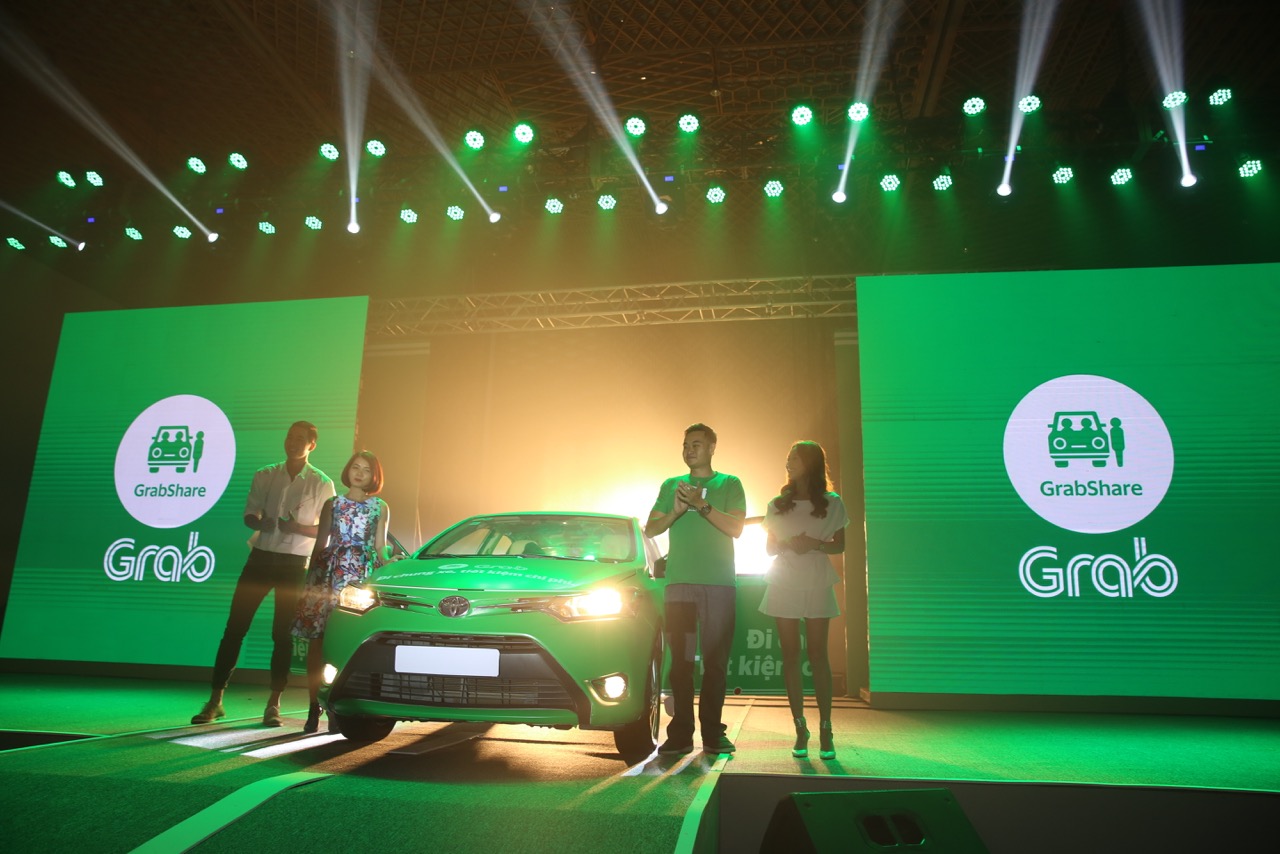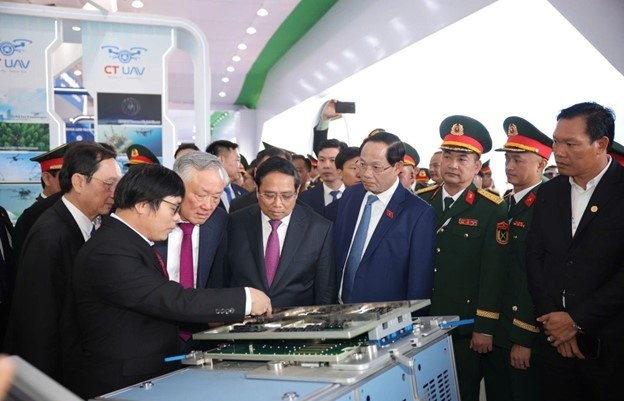Grab introduces GrabShare carpooling service to alleviate traffic congestion in Vietnam

| RELATED CONTENTS: | |
| Mai Linh and Vinasun trailing behind Grab and Uber | |
| Grab launches taxi beta trial in Myanmar | |
Traffic congestions are an inescapable condition in large and growing urban areas like Ho Chi Minh City. The municipal authorities have made several attempts to curb congestions, like promoting public transport, expanding infrastructure, and transforming urban spaces. However, the majority of these measures has only proved effective in the short-term rather than solving the roots of the problem.
According to transport expert Pham Sanh, the city should embrace more comprehensive solutions to deal with the problem shared by all major metropolitan regions. Carpooling in particular is an extension of the new sharing economy, which is becoming more popular around the world. Carpooling could be the best option to take cars off the road and lower the potential for traffic chaos.
The launch of Vietnam’s first on-demand carpooling service GrabShare is expected to make a difference by lowering the number of empty vehicles on the road and improving traffic flow. In fact, GrabShare has received positive feedbacks from customers in neighbouring markets like Singapore and Malaysia.
GrabShare relies on existing GrabCars to provide passengers up to 30 per cent cheaper rides from standard GrabCar fares, while helping drivers earn more by completing two passenger bookings in a single trip. By encouraging passengers to share their car rides, GrabShare matches two bookings in one trip to maximize a vehicle’s capacity, thus reducing the number of cars, cutting down congestions and carbon emissions with a single strike.
In addition, carpooling gives people an easy way to share the costs of their daily commute and maximize cost-efficiency. GrabShare’s matching algorithm ensures passengers get to their destinations in the shortest possible time. The algorithm calculates and determines a match by factoring in the closest available drivers, travel time, the overlapping of trip routes, detour distances, and current traffic conditions before sequencing pick-ups and drop-offs.
To get passengers quickly to their destinations, GrabShare pairs two passenger bookings with similar trip routes within a single trip. Passengers will only experience a maximum of two stops before reaching their destinations. For example, if Passenger A commences the ride and is paired with Passenger B, depending on the most efficient route, Passenger A may first stop to pick up and then drop off Passenger B.
Jerry Lim, Grab Vietnam’s country head, said that GrabShare gets passengers to carpool to their destinations at a more pocket-friendly fare with minimal detours, while reducing the need to put more cars on the roads.
“We are proud to deliver Vietnam’s first-ever commercial carpooling solution that we have continuously iterated and improved to provide Southeast Asia’s best carpool experience for passengers and drivers. We are confident that GrabShare enables us to meet Vietnam’s growing passenger demand for more affordable on-demand transportation while helping our drivers earn more,” he said.

Architect Kim Cuong recommended that Grab should pilot GrabShare in the most congested areas so commuters will see the benefits of car-sharing services in reducing privately-held vehicles and saving transportation expenses. Grab should clarify how carpooling contributes to better traffic flow and reduce carbon footprint, which will in turn encourage customers to support the sustainable development of the city.
Meanwhile, Khuat Viet Hung, vice president of the National Traffic Safety Committee said that traffic is keeping worsen due to a growing usage of private cars in large urban areas.
The Ministry of Transport (MoT) and provincial authorities have joined force to curb congestion by suspending pilot plan to apply technology in contracted passenger transport businesses like Uber and Grab. With the addition of GrabShare, Grab has made an additional contribution to traffic management while meeting people’s demand.

He hoped that GrabShare will lower the usage of privately-held vehicles on the road by increasing the number of commuters on the same ride, which will help ease traffic chaos at peak hour.
In addition, the application of GrabShare could be the best solution to manage unregulated ride-hailing services like illegal cabs in major cities like Hanoi and Ho Chi Minh City. The community car-sharing service like GrabShare could be the best solution for MoT and relevant agencies to manage contracted vehicles and passenger cars, boosting transparency and healthy competition in the market.
Grab officially launched GrabShare on May 9. GrabShare uses GrabCar (private hire car-hailing) to provide the company’s fourth transport option in Vietnam complementing GrabTaxi (taxi-hailing) and GrabBike (private hire motorbike-hailing). GrabShare is a testament to Grab’s commitment to developing tailored solutions to solve local transport challenges and improve people’s lives.
First introduced in Singapore last December, GrabShare has been launched across Southeast Asia and is now also available in the Philippines, Malaysia, and Indonesia. GrabShare has proven effective in attracting new passengers to the Grab platform. In the first five months since its first launch, Grab has completed more than 8 million GrabShare rides, for a total distance of over 72 million kilometres.

Along with the rapid passenger adoption of GrabShare, Grab has seen an improvement in passenger matching rate by 50 per cent in the three new cities that launched GrabShare in 2017. GrabShare is also helping to increase drivers’ monthly incomes by 15 per cent on average.
Lim said that Grab’s goal is to make on-demand transportation readily available and affordable so that people would no longer need to purchase and maintain a vehicle for their personal use. GrabShare enables the company’s drivers to serve more passengers, especially during peak hours when demand can be three times higher than usual. Starting today, passengers can choose between four transport services—GrabTaxi, GrabCar, GrabBike, and GrabShare—to suit their travel preferences, time, and budget.
Following the launch in Ho Chi Minh City, GrabShare will next be beta-tested in Hanoi to assess the margin it can help ease traffic congestions and provide more affordable transport options to passengers. With a launch expected in June, Hanoi will be the sixth city where GrabShare is available.
What the stars mean:
★ Poor ★ ★ Promising ★★★ Good ★★★★ Very good ★★★★★ Exceptional
Latest News
More News
- E-commerce race heats up with new player entering arena (December 19, 2024 | 16:03)
- Interest must rise for carbon exchange (December 19, 2024 | 16:00)
- Limitations abound for domestic EV carbon credits (December 19, 2024 | 15:00)
- Businesses pivotal in offsetting carbon measures in Vietnam (December 19, 2024 | 13:00)
- Coordination key for circular economy (December 19, 2024 | 10:56)
- Vietnam’s first logistics laboratory established (December 19, 2024 | 08:00)
- Masan Consumer Holdings honoured with consecutive "Great Place To Work" certifications (December 18, 2024 | 16:55)
- SABECO’s research facility a dream for its brewmasters (December 17, 2024 | 10:30)
- Digital twins reshaping Vietnam's logistics and supply chain landscape (December 17, 2024 | 09:34)
- Enterprises awarded for pioneering innovation to attract talent (December 16, 2024 | 16:43)

















 Mobile Version
Mobile Version